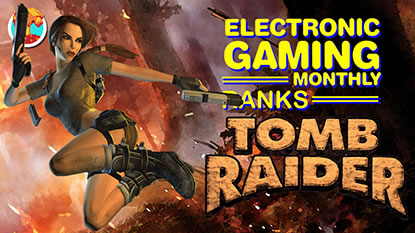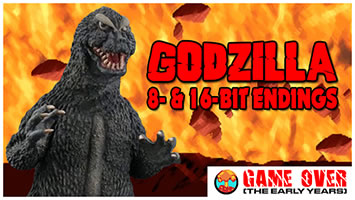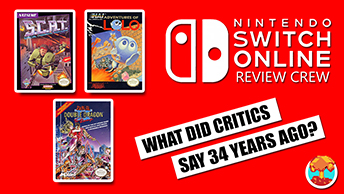- CLASSIC MAGAZINES
- REVIEW CREW
A show recapping what critics thought back
when classic games first came out! - NEXT GENERATION'S BEST & WORST
From the worst 1-star reviews to the best
5-stars can offer, this is Next Generation! - NINTENDO POWER (ARCHIVE)
Experience a variety of shows looking at the
often baffling history of Nintendo Power! - MAGAZINE RETROSPECTIVE
We're looking at the absolutely true history of
some of the most iconic game magazines ever! - SUPER PLAY'S TOP 600
The longest and most ambitious Super NES
countdown on the internet! - THEY SAID WHAT?
Debunking predictions and gossip found
in classic video game magazines! - NEXT GENERATION UNCOVERED
Cyril is back in this spin-off series, featuring the
cover critic review the art of Next Generation! - HARDCORE GAMER MAGAZING (PDF ISSUES)
Download all 36 issues of Hardcore Gamer
Magazine and relive the fun in PDF form!
- REVIEW CREW
- ELECTRONIC GAMING MONTHLY
- ELECTRONIC GAMING MONTHLY RANKS
From Mario to Sonic to Street Fighter, EGM
ranks classic game franchises and consoles! - ELECTRONIC GAMING MONTHLY BEST & WORST
Counting down EGM’s best and worst reviews
going year by year, from 1989 – 2009! - ELECTRONIC GAMING BEST & WORST AWARDS
11-part video series chronicling the ups and
downs of EGM’s Best & Worst Awards!
- ELECTRONIC GAMING MONTHLY RANKS
- GAME HISTORY
- GAME OVER: STORY BREAKDOWNS
Long-running series breaking down game
stories and analyzing their endings! - A BRIEF HISTORY OF GAMING w/ [NAME HERE]
Real history presented in a fun and pithy
format from a variety of game historians! - THE BLACK SHEEP
A series looking back at the black sheep
entries in popular game franchises! - INSTANT EXPERT
Everything you could possibly want to know
about a wide variety of gaming topics! - FREEZE FRAME
When something familiar happens in the games
industry, we're there to take a picture! - I'VE GOT YOUR NUMBER
Learn real video game history through a series
of number-themed episodes, starting at zero! - GREAT MOMENTS IN BAD ACTING
A joyous celebration of some of gaming's
absolute worst voice acting!
- GAME OVER: STORY BREAKDOWNS
- POPULAR SHOWS
- DG NEWS w/ LORNE RISELEY
Newsman Lorne Riseley hosts a regular
series looking at the hottest gaming news! - REVIEW REWIND
Cyril replays a game he reviewed 10+ years
ago to see if he got it right or wrong! - ON-RUNNING FEUDS
Defunct Games' longest-running show, with
editorials, observations and other fun oddities! - DEFUNCT GAMES QUIZ (ARCHIVE)
From online quizzes to game shows, we're
putting your video game knowledge to the test!- QUIZ: ONLINE PASS
Take a weekly quiz to see how well you know
the news and current gaming events! - QUIZ: KNOW THE GAME
One-on-one quiz show where contestants
find out if they actually know classic games! - QUIZ: THE LEADERBOARD
Can you guess the game based on the classic
review? Find out with The Leaderboard!
- QUIZ: ONLINE PASS
- DEFUNCT GAMES VS.
Cyril and the Defunct Games staff isn't afraid
to choose their favorite games and more! - CYRIL READS WORLDS OF POWER
Defunct Games recreates classic game
novelizations through the audio book format!
- DG NEWS w/ LORNE RISELEY
- COMEDY
- GAME EXPECTANCY
How long will your favorite hero live? We crunch
the numbers in this series about dying! - VIDEO GAME ADVICE
Famous game characters answer real personal
advice questions with a humorous slant! - FAKE GAMES: GUERILLA SCRAPBOOK
A long-running series about fake games and
the people who love them (covers included)! - WORST GAME EVER
A contest that attempts to create the worst
video game ever made, complete with covers! - LEVEL 1 STORIES
Literature based on the first stages of some
of your favorite classic video games! - THE COVER CRITIC
One of Defunct Games' earliest shows, Cover
Critic digs up some of the worst box art ever! - COMMERCIAL BREAK
Take a trip through some of the best and
worst video game advertisements of all time! - COMIC BOOK MODS
You've never seen comics like this before.
A curious mix of rewritten video game comics!
- GAME EXPECTANCY
- SERIES ARCHIVE
- NINTENDO SWITCH ONLINE ARCHIVE
A regularly-updated list of every Nintendo
Switch Online release, plus links to review! - PLAYSTATION PLUS CLASSIC ARCHIVE
A comprehensive list of every PlayStation
Plus classic release, including links! - RETRO-BIT PUBLISHING ARCHIVE
A regularly-updated list of every Retro-Bit
game released! - REVIEW MARATHONS w/ ADAM WALLACE
Join critic Adam Wallace as he takes us on a
classic review marathon with different themes!- DEFUNCT GAMES GOLF CLUB
Adam Wallace takes to the links to slice his way
through 72 classic golf game reviews! - 007 IN PIXELS
Adam Wallace takes on the world's greatest spy
as he reviews 15 weeks of James Bond games! - A SALUTE TO VAMPIRES
Adam Wallace is sinking his teeth into a series
covering Castlevania, BloodRayne and more! - CAPCOM'S CURSE
Adam Wallace is celebrating 13 days of Halloween
with a line-up of Capcom's scariest games! - THE FALL OF SUPERMAN
Adam Wallace is a man of steel for playing
some of the absolute worst Superman games! - THE 31 GAMES OF HALLOWEEN
Adam Wallace spends every day of October afraid
as he reviews some of the scariest games ever! - 12 WEEKS OF STAR TREK
Adam Wallace boldly goes where no critic has
gone before in this Star Trek marathon!
- DEFUNCT GAMES GOLF CLUB
- DAYS OF CHRISTMAS (ARCHIVE)
Annual holiday series with themed-episodes
that date all the way back to 2001!- 2015: 30 Ridiculous Retro Rumors
- 2014: 29 Magazines of Christmas
- 2013: 29 Questionable Power-Ups of Christmas
- 2012: 34 Theme Songs of Christmas
- 2011: 32 Game Endings of Christmas
- 2010: 31 Bonus Levels of Christmas
- 2009: 30 Genres of Christmas
- 2008: 29 Controls of Christmas
- 2007: 34 Cliches of Christmas
- 2006: 33 Consoles of Christmas
- 2005: 32 Articles of Christmas
- 2004: 31 Websites of Christmas
- 2003: 29 Issues of Christmas
- 2002: 28 Years of Christmas
- 2001: 33 Days of Christmas
- NINTENDO SWITCH ONLINE ARCHIVE
- REVIEW ARCHIVE
- FULL ARCHIVE
Beaten Down by the Two Hit Wonders
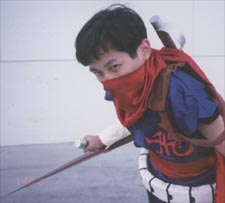
"Did you see a dog around here? What about a giant eagle?"
When I talk two hit wonders, I talk about games that only had one sequel, games that for whatever reason never counted to three. I am talking about games like Strider, one of Capcom's best 2D action games. No matter which version you played (unless it was the N.E.S. remix), Strider was a balls to the wall action game that tested your reflexes, and overwhelmed your vision with highly detailed graphics!
Strider 2, an arcade game that would eventually be ported to the PlayStation, would attempt, and in some ways succeed, to top what they had done a decade earlier. Fans of the series were ready to take Strider Hiryu back out for a spin, but Capcom seems to have no plans for a third installment. They have no problem releasing countless Resident Evil inspired gun games that do extremely poorly in sales, and are never recommended by critics, but when it comes to Strider, you're out of luck.
But then again, Capcom has always had this attention problem, especially when it came to their licensed titles. A game like Duck Tales would be a big hit and warrant a sequel, only to have the series stop with Duck Tales 2. Almost like clockwork they repeated this with Rescue Rangers, which was followed up by the Rescue Rangers 2, and never to be heard from again.
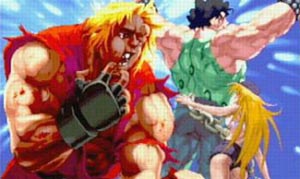
Street Fighter III is easy to hate, but is it really to blame for no third Power Stone?
What's frustrating about this trend is that quite a few great never see their way to number three. Power Stone and its sequel, Power Stone 2, are among the best multi-player games for any system. Yet here we are, years later, and there is no sign for a third edition. Perhaps they were spooked by the under whelming response to games like Street Fighter III, Dino Crisis 3, and P.N. 03!
Capcom isn't the only major company to succumb to this trend. Sega, Konami, and SquareSoft have all lost interest in a franchise from time to time. Problem is, some of the best ideas are lost when these companies change directions. Like Eternal Champions, the first game, for the Genesis, was a fairly standard 2D fighting game in the same vein as Street Fighter II. The sequel, Eternal Champions: Challenge from the Dark Side for the Sega CD, improved on just about every aspect, and proved that not only did the series have an interesting story, but also offered a number of new twists not seen in fighting games of the era. Had the series not be stopped, Eternal Champions could have been a really interesting 3D experience.
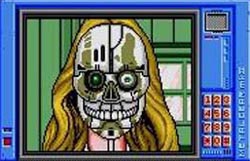
In the future, scientists will discover the harmful side effects of everyday make-up!
This strategy was repeated a generation later when Konami released the cult hit Poy Poy. This four-player game was ready to take on Bomberman or any other party game you could throw its way, literally. If you could see it, you could pick it up and hurl it at your enemies, until somebody is the last man standing. Even though a sequel was released in Japan, Poy Poy 2: Poitter's Point 2, it did little to sway Konami from cutting the franchise completely.
Too often Americans (and often Europeans) get snubbed when it comes to sequels released in Japan. Unfortunately SquareSoft knows this formula all too well. In a move managing to disappoint fighting fans and role playing gamers alike, Square decided to keep Tobal 2, the sequel to the critically acclaimed Tobal No. 1, in Japan only. Not only did it end up being one of the deepest fighting games of all time, but without worldwide support the franchise shriveled up and died.
One could argue that with a fighting game or a party game the death of a franchise is really short lived. It's only the deep games, like a role-playing game or an adventure game where you feel the impact. After all, these are the games that bother to develop a story they believe you will be interested in. If a franchise is only given a couple outings, how will it be able to capture the epic tales required of a proper story-driven game?
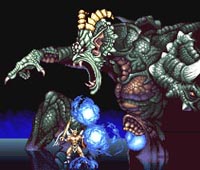
"Oh sure, it's all fun and games until somebody gets hurt!"
The first generation Super NES title Act Raiser was part SimCity, part
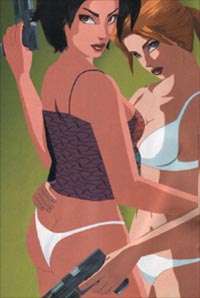
I don't think there's a caption needed here!
In the case of Fear Effect, Eidos created a story based around characters I actually cared about. Not just because there was an underlined lesbian current running through the whole game, and not just because it had good control, but rather because it had a fairly interesting story. Fear Effect: Retro Helix also managed to present a good story, with heart pounding action and amazing cinemas.
Three years ago a third Fear Effect was announced, but in the mean time the game has gone from being on its last legs to being cancelled. The game could resurface in the future, since it has been written, and some of the game was coded. But all hands seem to point to two hit wonder, if you ask me. [MORE]
HOME |
CONTACT |
NOW HIRING |
WHAT IS DEFUNCT GAMES? |
NINTENDO SWITCH ONLINE |
RETRO-BIT PUBLISHING
Retro-Bit |
Switch Planet |
The Halcyon Show |
Same Name, Different Game |
Dragnix |
Press the Buttons
Game Zone Online | Hardcore Gamer | The Dreamcast Junkyard | Video Game Blogger
Dr Strife | Games For Lunch | Mondo Cool Cast | Boxed Pixels | Sega CD Universe | Gaming Trend
Game Zone Online | Hardcore Gamer | The Dreamcast Junkyard | Video Game Blogger
Dr Strife | Games For Lunch | Mondo Cool Cast | Boxed Pixels | Sega CD Universe | Gaming Trend
Copyright © 2001-2025 Defunct Games
All rights reserved. All trademarks are properties of their respective owners.
All rights reserved. All trademarks are properties of their respective owners.













